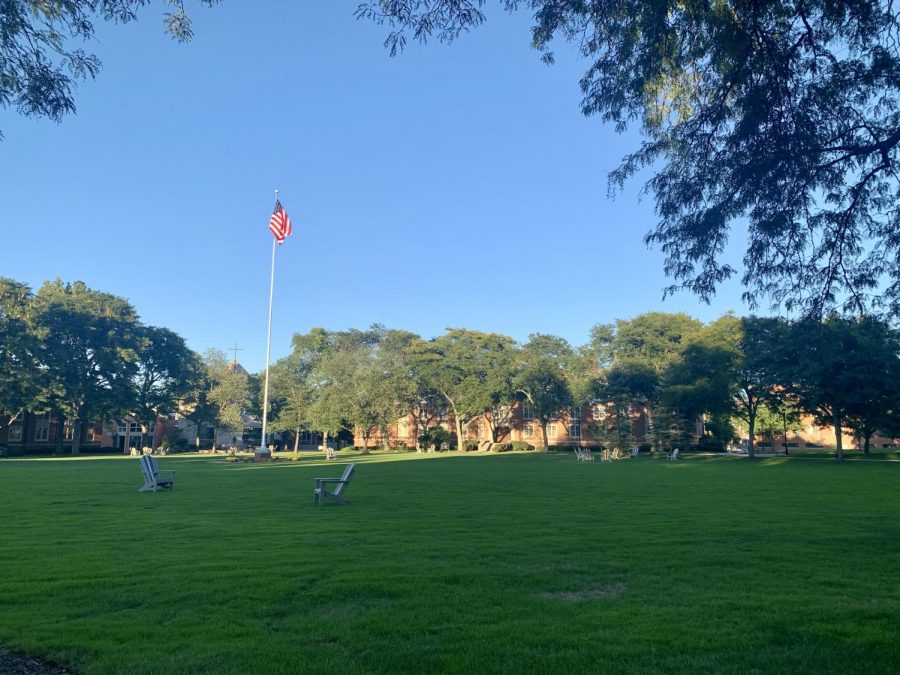No fall break and a shortened spring break: What does that mean for JCU?
John Carroll takes away fall break and shortens spring break amidst coronavirus pandemic and online learning.
Oct 22, 2020
In the response to COVID-19, JCU has changed its academic schedule, which has eliminated Fall Break and shortened Spring Break for the 2020-2021 academic year, while adding days elsewhere to compensate for it.
Breaks allow students to recuperate from late night studying, paper writing and school in general. They also allow faculty to take a break from grading and lecturing. Breaks help prevent burnouts.
Due to COVID-19, these breaks could be extremely unsafe for everyone both on and off campus. A study done by economists Daniel Mangrum and Paul Niekamp entitled “College Student contribution to local COVID-19 Spread: Evidence from University Spring Break Timing” concluded there was a significant rise in COVID-19 cases after students returned from traveling for spring breaks at all universities in 2020.
Recognizing this risk, Provost and Academic Vice President Steven Herbert explained the factors that contributed to these decisions. “The logic was that sending students, and faculty and staff as well, away for Thanksgiving and bringing them back afterwards put not only our community but also the families and the communities that they would visit over break at greater risk for spread of both COVID-19 and the flu.”
The thought that came across many John Carroll students after hearing that classes were online this semester, was that the schedule could go back to the original version which included a fall break. Herbert explained that it’s not that simple. “The reality is that there are many moving parts that go into planning how a semester is delivered, and changing the timing often has unintended consequences that must be managed.”
Despite what some may think, the online semester continues to drain students academically. Junior Lily Lathon said, “Doing all the work at home and online is exhausting, and I would love for even one day off.”
Associate Academic Vice President James Krukones offered tips to prevent students from becoming overwhelmed and burnt out, especially having fewer days off than usual. These tips include: maintaining a regular schedule as much as possible, eating meals at a table and not the desk, getting a good night’s sleep, taking a walk around the block to spend time away from the computer and reaching out to friends in a socially distanced manner.
John Carroll administrators made their decision based on research that extended breaks for universities lead to increased COVID-19 cases. Although there will not be as much of a break this semester as there has been in the past, evidence indicates that it is not safe for students. John Carroll administrators made a decision based on that evidence. Many students understand this decision even though it can make school more difficult.
Lathon said, “It’s conflicting because we need a break academically, but also it’s not safe to go out … and possibly cause an outbreak.”














Ella Schuellerman • Oct 22, 2020 at 10:17 pm
Dear John Carroll,
A Carroll News reporter worked on a story regarding the question on many John Carroll students have been asking for weeks. Despite this great reporting, I am very disapointed in the response from Provost and Academic Vice President Steven Herbert.
He reiterates that breaks are no more because COVID-19 cases will spike. He emphasizes that science shows there were spikes when college students were given breaks off of school in the spring of 2020, at the very start of the pandemic.
Mr. Herbert: What about closed college campuses? Is there science to back up closed campuses have spikes when students aren’t there? Can there be spikes on a campus that is closed and fully remote that deem reason to not give anyone a day off?
Do students who are fully remote with the same course schedule, same tuition, and a heavy workload not deserve a break? Do professors and faculty not deserve a break?
While Mr. Herbert says reworking the calendar is much more complicated than it appears. Not giving students and staff breaks during a fully remote semester is insinuating they do not deserve a break. It’s insulting and inconsiderate. I’ve heard countless stories from students who feel their workload is harder and heavier than it ever has been before, pre-COVID-19.
John Carroll has increased tuition by an average of 4% this academic year. A year that is 50% remote thus far.
John Carroll is charging students nearly $1,000 in student activity and technology fees yet the 3,137 undergraduate students are doing classes at home, on their own laptops, with their own wifi.
A lot of Residence Assistants apply to be RA’s because they need the free housing and stipend. John Carroll gave RA’s a week to move off campus when they decided 5 days into the school year to be fully remote.
John Carroll has stopped sending updates to the class of 2020 regarding any type of in-person commencement plan or honorary program after spending the entire spring emphasizing they will make it up somehow. Instead they created a video commencement where families had to quickly pause the screen to see their son or daughter’s name appear for a matter of seconds. Why the silence now?
I have spent hours of class time this semester having heavy conversations about this very topic with my peers. We are disappointed. We are being kept in the dark.
John Carroll: you can do better than saying it’s hard to change a calendar. You should be commending your staff and students for working through a pandemic. You should be giving your staff and students well deserved breaks, even if they are fully remote. Start being considerate because you are losing one of your biggest fans and I am sure many more.
Sincerely,
A Disheartened Senior; class of 2021
Mike Fazioli • Oct 22, 2020 at 10:15 pm
I disagree with the notion that breaks will allow kids to spread and possibly pass the virus. JCU hasn’t stopped any kid from doing that now?? Kids are having parties and get togethers all the time in and down Warrensville and other off campus housing. Right now there’s a JCU themed Halloween party at B Side club. Why hasn’t the school stepped in and stopped that? We need a break. We’re burnt out. We are tired. Our eyes hurt from staring at screens. Some Professors are taking advantage of the online format and have been loading us with assignments. I believe it’s unfair to take away our breaks for fear over spreading when kids are spreading as we speak. Professors and students need a break.